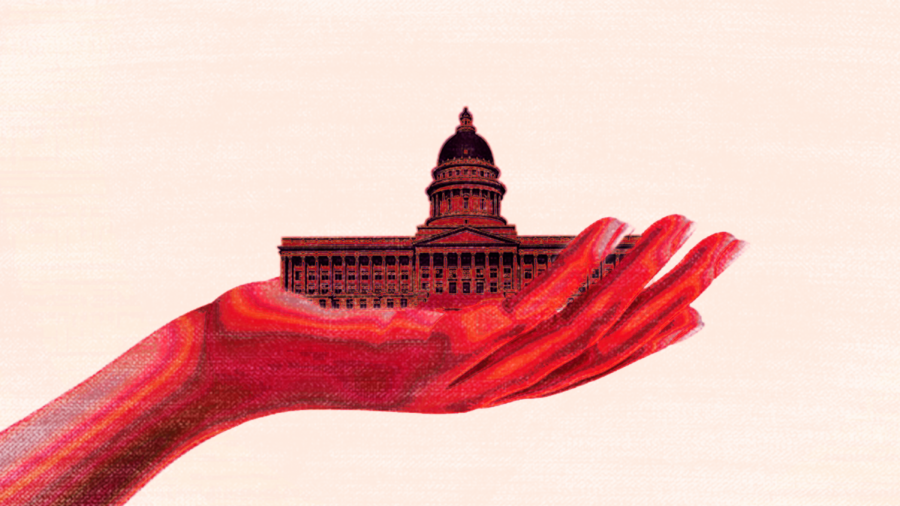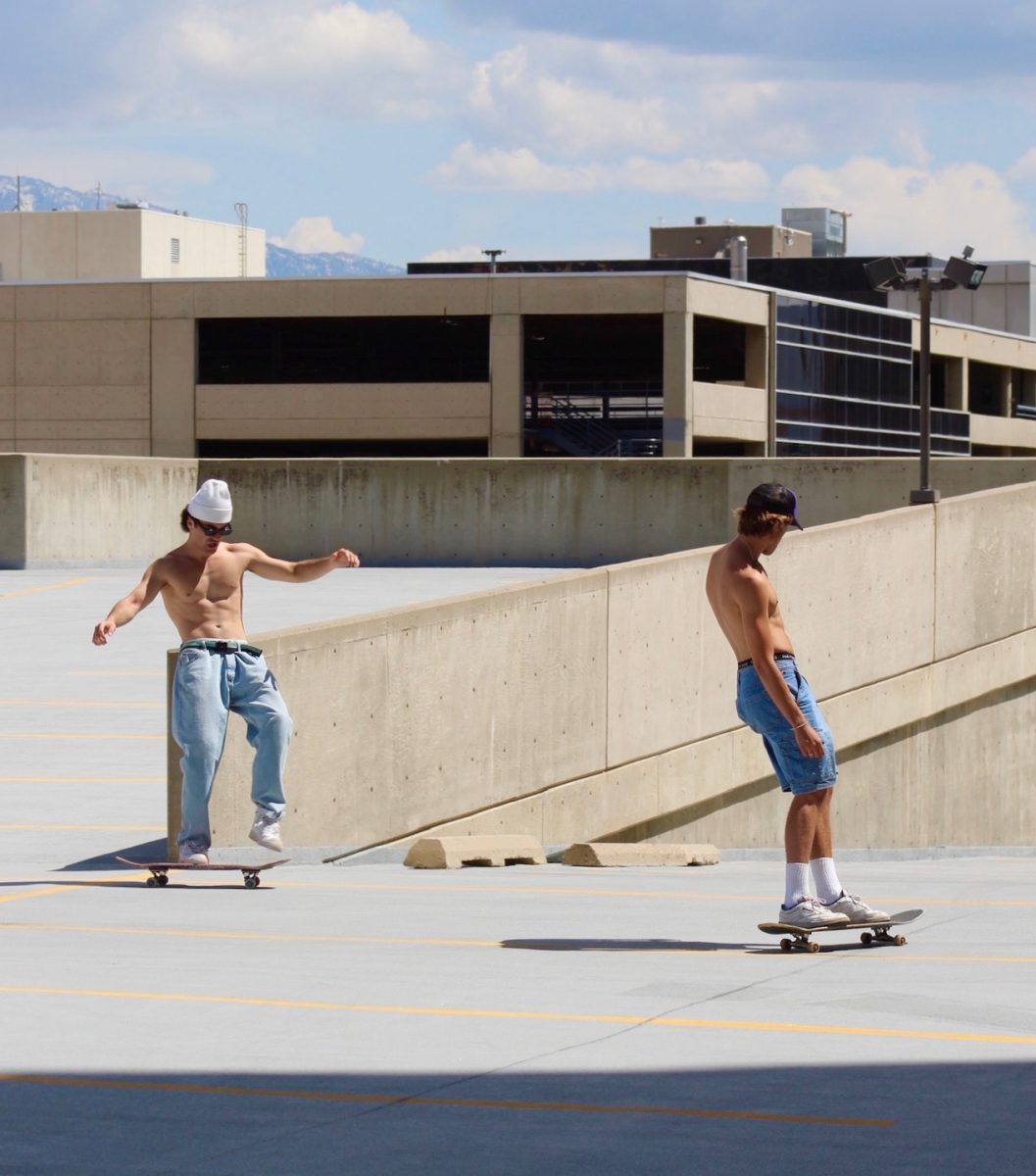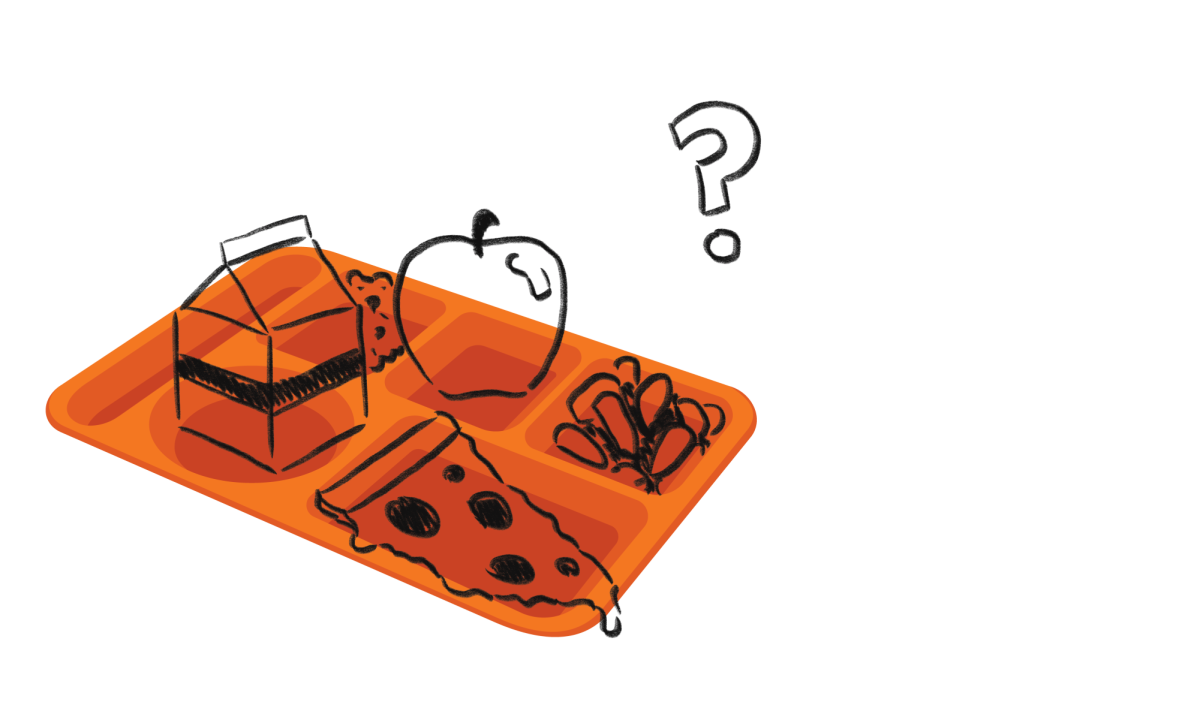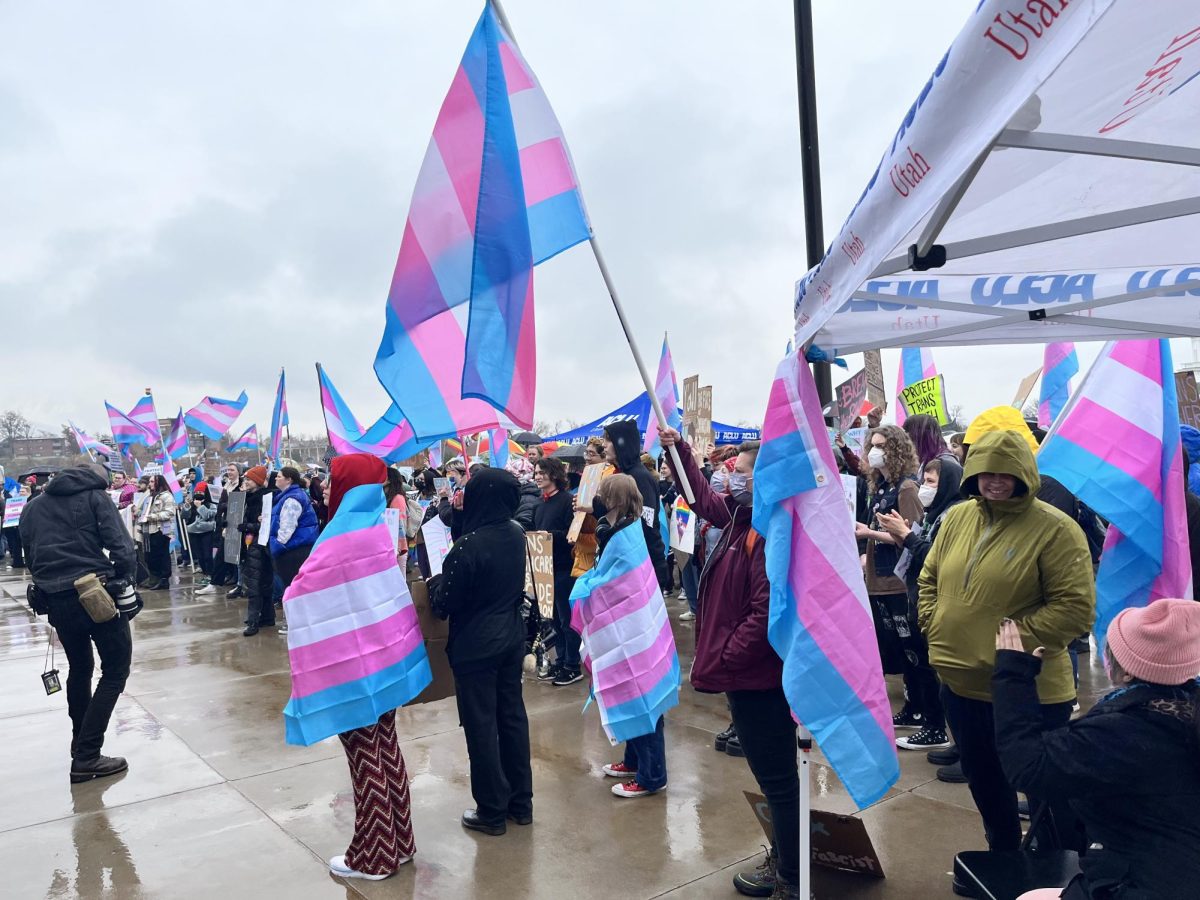Brown: Utah’s Liquor Laws Contradict Republican Values
(Graphic by Piper Armstrong | The Daily Utah Chronicle)
June 26, 2021
If there’s one value that the Republican party holds above nearly all others, it is the prospect of freedom. From lower taxes, to loosening speech restrictions, to ending mask mandates, Republicans withhold government intervention whenever possible. However, Utah’s Republican party does not apply those same freedoms to alcohol legislation.
On the first page of the Utah Republican Party’s official platform is the belief that “[government] must be restrained from intruding into the freedoms of its citizens.” The support of state-owned alcohol is completely contradictory. Utah Republicans consistently object to overreaching government and socialist programs, so a state-owned program such as the Department of Alcoholic Beverage Control (DABC) shouldn’t hold so much power. Yet, the Utah Republican party supports one of seven state-controlled liquor programs in the nation and allows a program that runs contrary to their values. They must work harder to enhance freedom.
Since I became voting age, I’ve been a registered Republican. Generally speaking, I believe the government sucks at most things, and it should go away whenever possible. This sentiment holds the same for most Utahns. Today, Republicans make up almost half of registered voters in Utah, more than three times the number of registered Democrats. Through the lens of demographics, this is no surprise. The Church of Jesus Christ of Latter-day Saints dominates the political scene — more than 60% of the population is LDS, and 70% of those who identify as LDS lean Republican. Yet, programs like the DABC still exist, contradicting traditional Republican values.
Somewhat unpredictably, the justification for DABC’s existence is public safety. To gain insight on the Utah Republicans’ support for the state-run program, I had a conversation with Rep. Timothy Hawkes, a strong promoter of the DABC. When asked about the contradiction, Rep. Hawkes didn’t mention the dominant religion, as some might have expected, but instead discussed the protection of liberties of those who are not consuming alcohol. He said, “Whether it’s liver cirrhosis and I have to pay for your cirrhosis, or — I had a great grandfather who was killed by a drunk driver… on the streets of Salt Lake City. You know, that’s what we’re trying to mitigate. It’s not so much somebody drinking alone in the corner that we worry about.”
DABC’s goal, according to Rep. Hawkes, is to “interfere with the free market.” By disrupting the public’s access to alcoholic products, the social consequences can be mitigated. That’s a fair argument and an important one at that. More than 50 people are killed in Utah per year from alcohol-related traffic incidents, and while that number has consistently gone down, it’s still too high.
However, this restricts the options law-abiding citizens have to drink in their homes when they want to. Want to have a glass of wine for Thanksgiving dinner? Sorry, the liquor store is closed. Looking to have a fun late night in with friends? Better be quick — most liquor stores close at either 7 p.m. or 10 p.m. Strong restrictions also apply to businesses in Utah. Bars cannot stay open past 1 a.m., and there are various nitpicky restrictions on serving alcohol. Maximizing safety is vital, don’t get me wrong. But maximizing the freedom of those who want to make their own decisions on alcohol consumption cannot be ignored.
DABC’s existence seems like a net benefit for Utah, as alcohol-related driving deaths have trended downward for around 40 years. However, there must be ways to achieve that same benefit while allowing for expanded liberty. I prodded Rep. Hawkes about this by asking if the same benefits could be achieved through enhanced education, harsher DUI sentences, or expanded night police presence. He said that while Republican lawmakers are “open to all of those kinds of things,” it would be difficult to test these potential solutions because there could be serious safety repercussions if they don’t work.
The catch is that alternate solutions have been proven effective. High-visibility enforcement greatly reduces DUI incidents. Also, in Texas, harsher DWI penalties have led to the fewest DWI fatalities per 100,000 people per year. While I understand the difficulty of trying new solutions in an established system, settling for a safety solution that restricts freedom is unacceptable. Utah Republicans should research alternative safety-ensuring methods. They are turning a blind eye to their foundational values and sending their constituents mixed signals.
If Utah Republicans are serious about giving their voters freedom, they must move away from the DABC. The program has shown to be fairly effective on the safety front, but at a cost that cannot be easily overlooked. The stated goal is to promote limited government and individual responsibility, so let’s see it. Stop settling for less-than-perfect solutions because while this may seem like a trivial issue, it reveals how actions often stray from values.













Drew • Sep 15, 2021 at 1:40 am
I disagree inherently with the title. If recent Republican politics prove anything, it’s that the GOP wants absolute control of everything. It is sad to see the rise of new authoritarianism.
Kimberly • Jul 1, 2021 at 7:59 pm
If public safety was truly a concern then mask mandates would have started earlier and lasted longer. If safety was a concern the legislature would not have restricted the female mayor’s of salt lake city and county from listening to the health experts and protecting their citizens. They don’t give a —- about safety when it comes to covid.
Steph Nagin • Jun 28, 2021 at 4:56 am
Long-standing Republican philosophy holds that the government should not interfere with the public marketplace absent a demonstrable failure of the marketplace that cannot be ameliorated or prevented by laws addressing whatever is causing the alleged failure of the marketplace.
Laws to restrict sales to minors, or to prevent driving under the influence of alcohol (or sales of illicit drugs) are examples of sound public policy without any necessity for the State government to usurp the public marketplace.
What Jackson Brown’s article identifies as a significant and unwarranted intrusion by the Utah Legislature, also is a gross distortion of Republican philosophy. The fact Utah’s state-run liquor stores don’t routinely stock (or keep in stock) what many shoppers wish to purchase; or do not offer sales of alcoholic beverages comparable to what exists in a free marketplace, simply underscores the reality that the Utah government is not a competent marketer! It should not supplant competition with a monopoly, unless a demonstrable “failure of the marketplace” exists. Utah’s governmental monopoly simply aggravates and distorts the marketplace.
No widespread anticompetitive practices exist. There is no demonstrably false and deceptive advertising distorting the marketplace that requires protection of consumers. Only if those types of circumstances existed, might temporary government intervention be needed to restore competition.
When our country was expanding rapidly two centuries ago, there was a need for the “pony express” to deliver letters, (which ultimately led to creation of the United States Postal Service).
However, Amazon™️, Federal Express™️, and a slew of private competitors — as well as the advent of the Internet — demonstrate: the private marketplace is vibrant!
We tolerate a government-run postal service for fewer deliveries and ancillary services although the USPS now competes with private entities as well as with the Internet [both of which supplant many functions the USPS formerly provided]!
The best approach for Utah would be to permit the marketplace for alcoholic beverages to similarly transition from an existing, very poorly run and money-losing, government-run ABC monopoly. Let’s permit private enterprise to function in alcohol sales as it does in most other States.
Harmon’s in downtown SLC, for example, has a post office within its store! Why couldn’t all supermarkets in Utah offer postal services if they want to do so? For that matter, let Utah’s ABC stores try to compete — if they can — as Smith’s Harmons, Rio Rancho, and multiple other supermarkets markets would offer better selection. If Utah’s ABC stores cannot survive with competition, they should cease to exist. Real competition would better serve Utah’s citizens, than our current, poorly run money-losing monopoly!
If widespread misconduct occurs in the marketplace and is unable to be corrected by reasonable laws and tough law enforcement, government enforcement or intervention might justify its existence. However, Utah’s current poorly run ABC Stores simply constitute a gross distortion, and an outlier approach that is an unmitigated anachronism.
Sly • Jun 27, 2021 at 6:51 am
I’m a Texan. It’s cool to read that we have the lowest fatalities related to alcohol, but I think it should be mentioned that we also have strict alcohol laws. Liquor stores close at 9 pm. Bars must close by 2 am (but many close at midnight on their own). No liquor purchases on Sundays. Liquor is ONLY sold at liquor stores. Beer and wine can be purchased at many grocery stores and corner stores/gas stations.
I agree that these laws restrict freedom of personal choice and economy. Yet, though I would support more freedom of choice, I cannot deny that I’m secretly grateful for the restrictions. There’s a measure of safety for citizens that comes from these overreaching laws. However, we are American and each individual is entitled to make decisions for his/herself.
Donald Berube • Jun 26, 2021 at 8:49 pm
If anyone tells you that control of liquor in Utah is about anything other than pure greed of money by the state, then they are liars. At one time it might have been about safety or religion, but it is all about revenue through control of liquor today.
Under the new Utah liquor laws I can bring nine liters of liquor home from out of state. With any luck, I’ll never have to buy liquor in Utsh again.
Stop the greed and set us free!